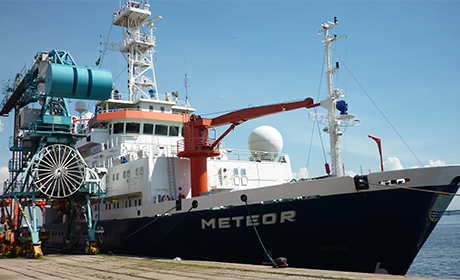In Search of Connections Between Climatic and Cultural Change
31 March 2017

Photo: Tobias Fischer
How did environmental and climatic changes early on in human history influence cultures – and what conclusions can be drawn relative to climate change today? These questions are the subject of a three-week expedition aboard the research vessel METEOR that will take an international team of geoscientists and archaeologists, led by researchers from Heidelberg University, into the eastern Mediterranean. "The goal is to reconstruct the climate and ecosystem dynamics over the past 10,000 years there, for both the coastal countries and the marine area, and to place them in relationship to archaeological finds," explains expedition leader Prof. Dr Jörg Pross of the Institute of Earth Sciences. Cooperation partners from Greece, Italy and the USA will be joining the voyage scheduled for the fall of 2017.
"The history of the eastern Mediterranean region is marked by repeated socioeconomic and sociocultural upheaval. Although climate is suspected to lie at the root of some of this upheaval, we do not yet have climate data that we can connect to findings from archaeological research that would explain any possible relationships," explains Pross. To reconstruct the changes on both land and sea, the researchers will extract core samples from the sea floor near the coast. The drill cores hold various climatic and environmental indicators, such as pollen from land plants that end up deposited on the sea floor. "By taking this approach, we can reconstruct the environmental conditions in those regions and times that our colleagues from archaeology have identified as characterized by drastic sociocultural change," states Prof. Pross. The core sediments will be analysed in Heidelberg.
At the same time, the researchers want to use the drill cores to reconstruct how the ecosystems in the eastern Mediterranean have changed over the last 10,000 years. For example, previous data suggests that many more fish lived there 6,000 years ago and that the composition of the populations was very different. "The entire marine food chain has changed drastically," says Pross. The researchers will investigate the extent to which this change in food resources also affected the early cultures along the Aegean coast – and vice versa, whether those cultures intervened fundamentally in the structure of marine ecosystems. To this end, the experts will analyse microscopically small fish scales and teeth preserved on the sea floor.
"Against the backdrop of today's human-induced climate change, the question of how earlier climatic changes affected humankind has become one of the most pressing issues at the intersection of science and the humanities," stresses Prof. Pross, who is also a member of the Heidelberg Center for the Environment (HCE). "The intensive dialog already ongoing between paleoclimatologists and archaeologists at the HCE is a critical prerequisite for uncovering the relationships between climatic events and socioeconomic upheaval and for discovering the underlying processes."
The research expedition aboard the METEOR is being funded by the Federal Ministry of Education and Research and the German Research Foundation.

